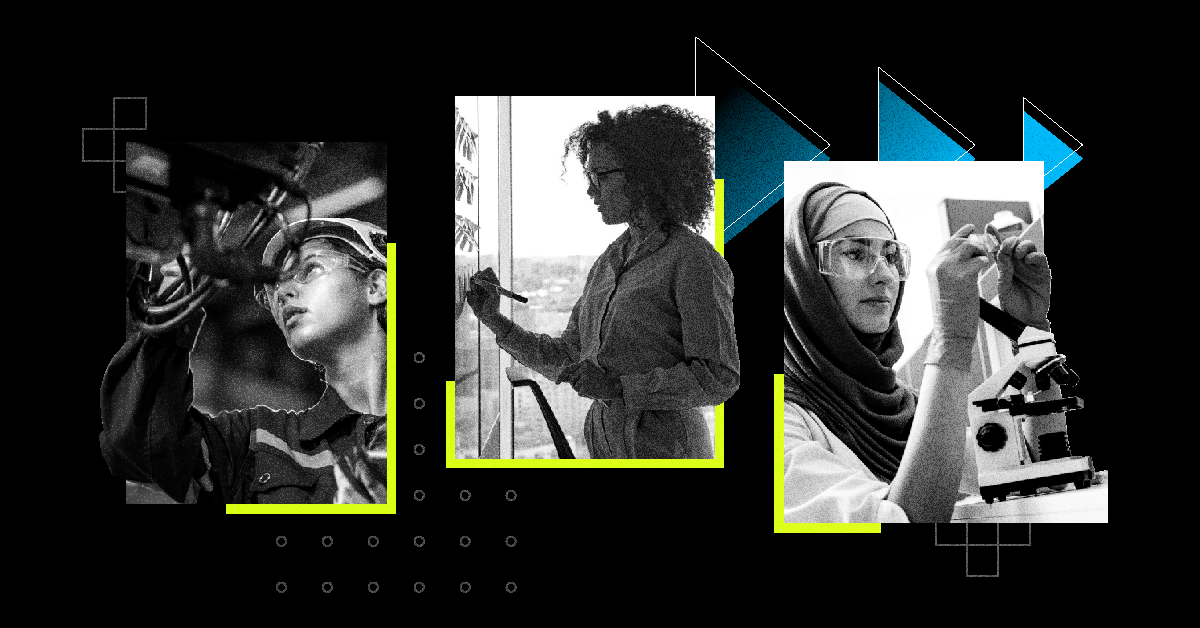On International Women’s Day, The Female Quotient posted a humorous Instagram video illustrating how inconvenient life would be without key inventions by women. A frustrated driver throws a paper map out his car window before highlighting Gladys West’s mathematical modeling of the earth that laid the foundation for GPS. The post recalls Marian Croak’s development of the “Voice over Internet Protocol” – the technology behind Zoom and FaceTime. And the video itself flickers to remind us that legendary movie star Hedy Lamarr co-invented frequency hopping in 1941, the precursor to Wi-Fi. Many of these technologies power supply chains – from cobots to buyers – every single day.
We’ve entered a new era of technology innovation: the AI revolution. This is a time of great invention and reinvention of supply chain – we are at an inflection point, and the time is now to leverage the collective diversity of our teams to seize this AI moment. Take, for example, the creation of large language models, the backbone of genAI, which is built on the premise that diverse perspectives (and training data) reduce hallucinations and inaccuracies. Diversity breeds innovation.
Our collective aspiration is to make supply chain the destination of choice for female leaders and inventors. Our data suggests that while there is always room to grow, we are making progress – supply chain roles are now 50% more likely than non-supply chain roles to mention women networks, have initiatives to support woman-owned businesses, or state that women are encouraged to apply.
This is evident in Toyota's effort to support woman-owned suppliers, P&G highlighting recognition it has received as a top company for executive women, and Maersk's Power Women Network, which is for those "who want to make a real change on inclusive leadership and equitable career progression for women.” These efforts matter. In fact, we might argue that gender diversity and inclusion are the secret sauce to successful AI experiments and implementations. Why? Because executives prioritizing gender diversity will find that their teams are more creative and open to change.
Seize This AI Moment by Empowering Female Ingenuity
Supply chain is a male-dominated industry. So is the tech industry. Looking for skills from both will present new gender diversity challenges for leaders in more digital supply chains. Here are some actions to take now:
- Build new partnerships: Seek to work with organizations that can connect your supply chain to highly skilled women and underrepresented minorities, especially in tech. For example, Walmart invites graduating students to take part in CodeHers, India’s biggest coding challenge, exclusively for women. This is an opportunity for young women from engineering colleges across India to achieve full-time software development engineering roles and summer internships at Walmart Global Tech India.
- Invest in digital upskilling for women: Fast-track women into more digital roles by funding further education and building apprenticeship programs that offer the chance to receive direct coaching support and hands-on experience. A few critical skills that are supportive of AI/ML work are Python, natural language processing, data science, and computer vision.
- Actively challenge bias when building project teams: Factor gender diversity into how digital project teams are selected or explore how AI-powered talent marketplaces could de-bias selection. Meta’s Fundamental AI Research (FAIR) lab, responsible for Llama and other breakthroughs, is made up largely of women. Around 60% of its leadership team are women and some reporting chains, according to interviews with people inside the organization, are female from top to bottom. Kim Hazelwood, director of infrastructure at FAIR, says the culture of openness is connected to the diversity of FAIR.
- Double-down on sponsorship for women: Create a simple requirement – every senior leader in supply chain should sponsor a woman. The CPO for Bombardier, Shauna Gamble, has acknowledged the importance of “super sponsors” when it comes to her own career success. “Most of my career has been paved by my sponsors,” says Ms Gamble. “They saw in me the next step, the next challenge, the next capability. I trusted them, and they never let me down.”
It’s estimated that it will be 131 years before we finally bridge the gender gap. It’s an abysmal number that we rarely question because gender equality can feel like an impossible, unending task. But every action matters. Each of us as leaders has the power to accelerate progress – in who we hire, how we lead, and the environment we create with our teams.
Can we solve gender inequality in supply chain overnight? No. But can small decisions add up to a much bigger shift? The only way to find out is to try.
The Zero100 Community is made up of some incredibly inspiring women playing critical roles in supply chains across the globe. Over the past year, we've shared some of their stories in our series, The Path, which spotlights some of their successes, hurdles they've faced, advice they would give to others, and their hopes for the future. You can watch it here.
